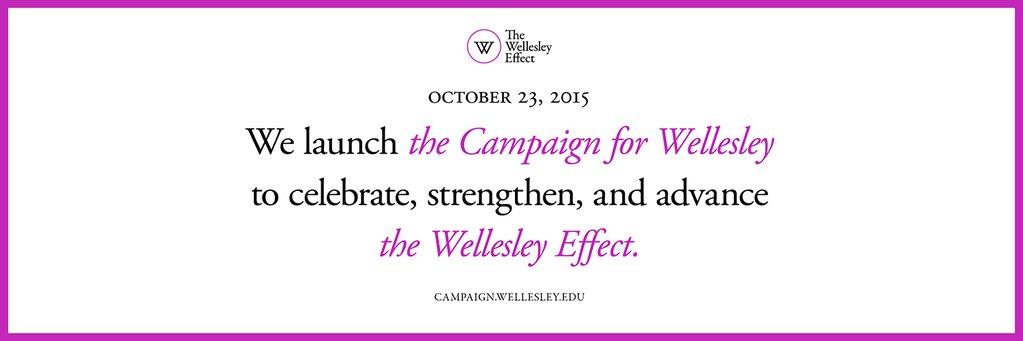Wellesley is currently preparing its facilities to welcome hundreds of alumnae and speakers this weekend, who will launch a fundraising effort, known as The Wellesley Effect. A global campaign, The Wellesley Effect seeks to highlight the importance of women’s colleges and liberal arts education. In face of globalization and shifting geopolitical borders and identities, the campaign directly addresses Wellesley students’ roles as harbingers of social change and innovation.
The campaign employs buzzwords like “leadership,” “network,” and “interdisciplinary thinking,” but how effectively can it address the concerns of Wellesley students and recent graduates? In a time of worldwide recession, can the Wellesley Effect improve our job prospects? Amidst heated debates regarding institutional racism, social class and the gender binary, will the Wellesley Effect address how race and gender intersect with students’ livelihoods and employment opportunities? Perhaps we should ask the one question that haunts many students during their time at Wellesley: are we truly enhancing our minds with a liberal arts education, or are we simply training to become corporate drones in pressed suits?
If the Wellesley Effect seeks to enact social change through Wellesley students, then we need to maximize the opportunities of future generations through more on-campus research opportunities for STEM and humanities students, more job recruiting opportunities and more fellowships, scholarships and institutes. The generosity and inspiration that Wellesley alumnae give to our community are crucial to ensure greater opportunities for current and future students. Take the example of one of our most renowned alumna — Madeleine Albright. On the 50th anniversary of Secretary Albright’s graduation from Wellesley, there was much talk about how to best honor her memory on our campus: a building, a dormitory or a scholarship? But Secretary Albright did not want to be remembered with a building. She wanted to invest in future generations and have students remember her through greater access to opportunities. The Madeleine Korbel Albright Institute for Global Affairs was founded shortly after, giving students the opportunity to learn. The Institute provides a month’s worth of lectures in global leadership, funding for work abroad for a summer and a lifetime’s worth of networking opportunities. In short, it’s an institute that honors a renowned alumna by contributing to the development of more successful alumnae.
Although many of Wellesley’s buildings are in urgent need of renovation and much of the fundraising for The Wellesley Effect will go toward Wellesley 2025, we should not lose sight of investing in our students. We need to invest in more fellowships, scholarships and institutes that are specifically tailored for Wellesley students, and we need to help programs like the Albright Institute and Wellesley in Washington unleash their full potential. Wellesley students majoring in STEM often journey to MIT in search of better research opportunities and facilities — the leap from a small liberal arts college to a multi-tiered research institute is not necessary. Rather, we would like to see The Wellesley Effect fund more on-campus STEM research and opportunities. Not only will this encourage more Wellesley students to enter the science fields, but it would improve the College’s reputation as an advocate for the liberal arts. At the very least, investing in closer ties between Wellesley’s Science Department and research institutes in Boston would benefit students in terms of finding science-oriented internships, jobs and post-graduate admissions.
Current and future Wellesley students also need more networking and career building opportunities, particularly humanities and STEM majors. If one scrolls through the CWS’s job openings for seniors, the vast majority of listings relate to consulting, finance or business. Many Wellesley students are interested in these sectors and they need the wide array of opportunities that are available for them. However, we also need to ensure that those students who want to pursue careers in writing, scientific research, art or community activism also have a wide array of opportunities available for them. The CWS’s listings reflect the reality of the job market: there are simply a lot more opportunities in the business sector than there are in journalism or the non-profit sector. Yet, this is precisely in what we need to invest. After all, some of the best learning and development comes from experience.
The Wellesley Effect campaign promises to increase understanding of the value of a women’s college education. In doing so, it also, however, emphasizes global change. Indeed, Wellesley students can only bring this sort of change by engaging with various cultures and communities. Yet, the College itself has much to improve upon when it comes to the concerns of on-campus minorities. As of recently, the College lacks a multicultural space for Wellesley students, and often passes distinguished professors over for tenure in various fields of cultural studies. The values propagated, particularly multicultural competency, should be strongly reinforced in the College in the years to come.
The Wellesley Effect possesses the potential to transform the College and women’s education worldwide. We look forward to welcoming a group of alumnae and leaders that will enrich Wellesley in innumerable, significant ways. We also look forward to their solidarity and support when it comes to creating a better Wellesley, especially when it comes to these issues.





